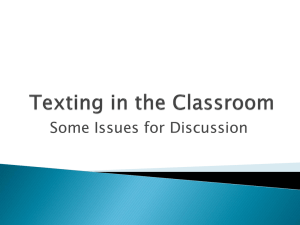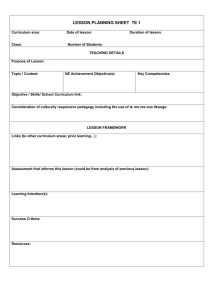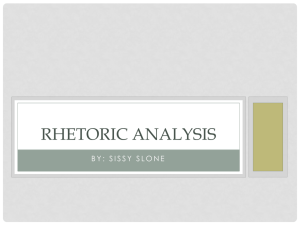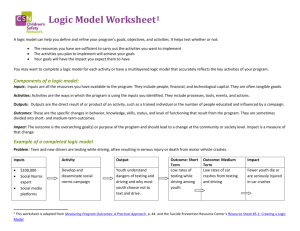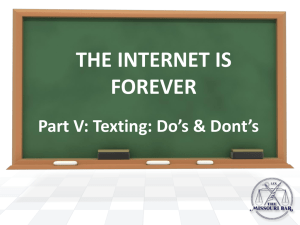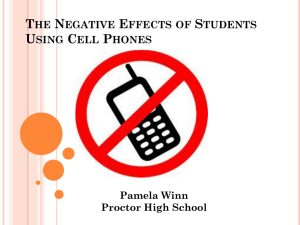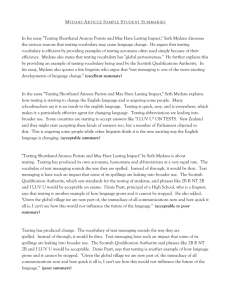CCI Texting for Better Care Grant Report: Documenting Progress
advertisement
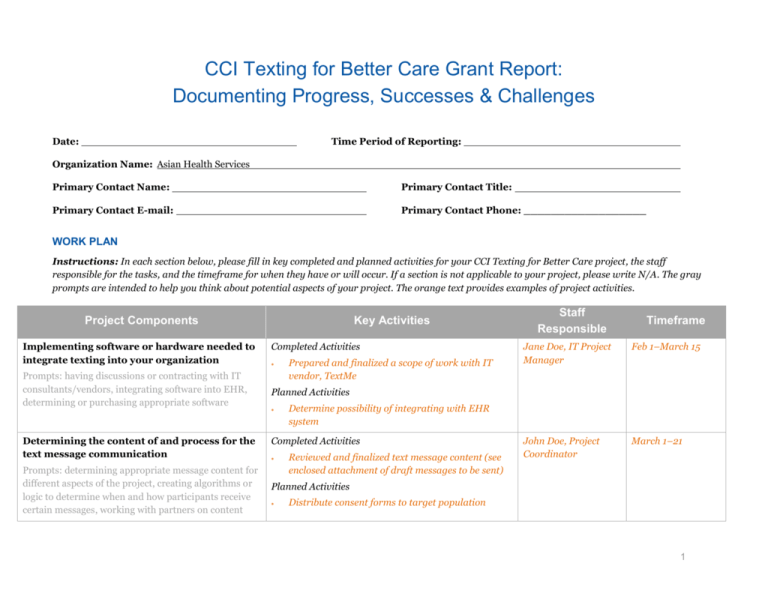
CCI Texting for Better Care Grant Report: Documenting Progress, Successes & Challenges Date: Time Period of Reporting: Organization Name: Asian Health Services Primary Contact Name: Primary Contact Title: Primary Contact E-mail: Primary Contact Phone: __________________ WORK PLAN Instructions: In each section below, please fill in key completed and planned activities for your CCI Texting for Better Care project, the staff responsible for the tasks, and the timeframe for when they have or will occur. If a section is not applicable to your project, please write N/A. The gray prompts are intended to help you think about potential aspects of your project. The orange text provides examples of project activities. Project Components Implementing software or hardware needed to integrate texting into your organization Prompts: having discussions or contracting with IT consultants/vendors, integrating software into EHR, determining or purchasing appropriate software Determining the content of and process for the text message communication Prompts: determining appropriate message content for different aspects of the project, creating algorithms or logic to determine when and how participants receive certain messages, working with partners on content Key Activities Completed Activities Prepared and finalized a scope of work with IT vendor, TextMe Staff Responsible Timeframe Jane Doe, IT Project Manager Feb 1–March 15 John Doe, Project Coordinator March 1–21 Planned Activities Determine possibility of integrating with EHR system Completed Activities Reviewed and finalized text message content (see enclosed attachment of draft messages to be sent) Planned Activities Distribute consent forms to target population 1 Project Components Preparing the organization and staff for this project Prompts: creating awareness of the project, securing buy-in from senior leaders, training front line staff Key Activities Staff Responsible Timeframe Completed Activities Planned Activities Creating protocols, procedures or tools needed for project implementation Prompts: creating model prototypes or protocols, determining and adjusting staff workflow for project, ensuring security and HIPAA compliance Getting consent from participants to use texting as a communication method (as appropriate) Prompts: requesting that participants mark preferred communication methods, creating consent forms Completed Activities Planned Activities Completed Activities Planned Activities Implementing the texting project Prompts: launching text messaging with participants, tracking and monitoring responses, troubleshooting challenges as they arise Completed Activities Planned Activities Assessing project impact Prompts: aggregating and examining final project data, assessing the overall successes and challenges, extracting lessons learned, determining cost-benefit to the organization, considering strategies for sustainability as appropriate Completed Activities Planned Activities 2 Project Components Moving forward Prompts: closing the pilot project; continuing with current level of project; expanding the project to additional sites, populations or conditions Key Activities Staff Responsible Timeframe Completed Activities Planned Activities Other activities Is there anything else related to this project that you have completed or are planning to work on that has not already been mentioned? Completed Activities Planned Activities REFLECTIONS ON THE PAST THREE MONTHS Instructions: Please briefly answer the following questions regarding your CCI Texting for Better Care project. 1. Has anything changed or evolved from your original plans? a. If so, what has changed and why? 2. Has your project encountered any barriers or challenges over the past three months? a. If so, how, if at all, have you addressed them? 3 3. What are some the key lessons learned, new insights or “a-ha!” moments you have encountered while implementing (or planning for) this texting project? Consider your experience selecting and using software or hardware for the texting; determining the content of and process for the text messaging; preparing the organization and staff for the project; creating protocols, procedures or tools; getting consent from participants; launching the text messaging with participants; tracking and monitoring responses and impact data. 4. Are there any resources, support or assistance that would be helpful as you continue working on your project (e.g., from CCI, Informing Change, others)? 5. Is there anything else that you think is important for us to know about your project at this time? REPORTING ON MEASURES Instructions: Please submit your data on the following measures. If you have don’t have data on a specific measure at this point in the project, please indicate this by writing N/A. If your data are in a spreadsheet format, please feel free to include an attachment with the data. In addition, if you are using a control group, please report on both the treatment and the control group. Participant eligibility criteria: Asian Health Services patient Either 18-24 years old or will turn 18 years old within six months From low-income, limited-English speaking or un/underinsured families Asian and Pacific Islander families 4 PATIENT INVOLVEMENT IN PROJECT _____ Total number of patients determined eligible for project _____ Number of patients who are eligible but are not included in the project Explanation of reasons for exclusion from project: _____ Number of patients who did not have a phone _____ Number of patients who had a phone number but clinic could not reach with a text message (e.g., land line, disconnected line, did not have texting capabilities on their phone, etc.) _____Number of patients who opted out of the project themselves Explanation (and count, if possible) of reasons for patients opting out (e.g., thought the texting would be cost-prohibitive, do not know how or are not comfortable texting, other reasons) _____Number of patients included in this project as participants (i.e., who receive the first text message) PARTICIPANT ENGAGEMENT WITH MESSAGES _____ Total number of text messages sent to participants _____ Number of text messages sent that do not request a response (e.g., one-way texts) Type of one-way text messages sent to participants (e.g., introductory messages, reminders, educational messages, encouraging messages) _____ Number of text messages sent that request a response (e.g., two-way or bi-directional texts) Type of text messages sent to participants (e.g., request for report on self-management goals, request for appointment confirmation, etc.) _____ Number of text message responses received from participants As appropriate, describe the types of responses received (e.g., confirming appointment, acknowledging text, etc.) 5 CHANGES IN PARTICIPANTS’ ACTIONS OR BEHAVIORS _____ Number of youth participants who indicate an interest in insurance counseling: _____ Number of youth participants who indicate an interest in insurance counseling who receive counseling or assistance at AHS _____ Number of youth participants who indicate an interest in insurance counseling who enroll in insurance Type of insurance that each of these youth are enrolled in (e.g., Covered CA, Medi-Cal, other insurance) Note: At a later point in the project, Informing Change will check in about the feasibility of conducting a short survey with youth participants and project staff about the utilization of texting as a way to communicate and connect youth to health resources and support. Thank you! 6
